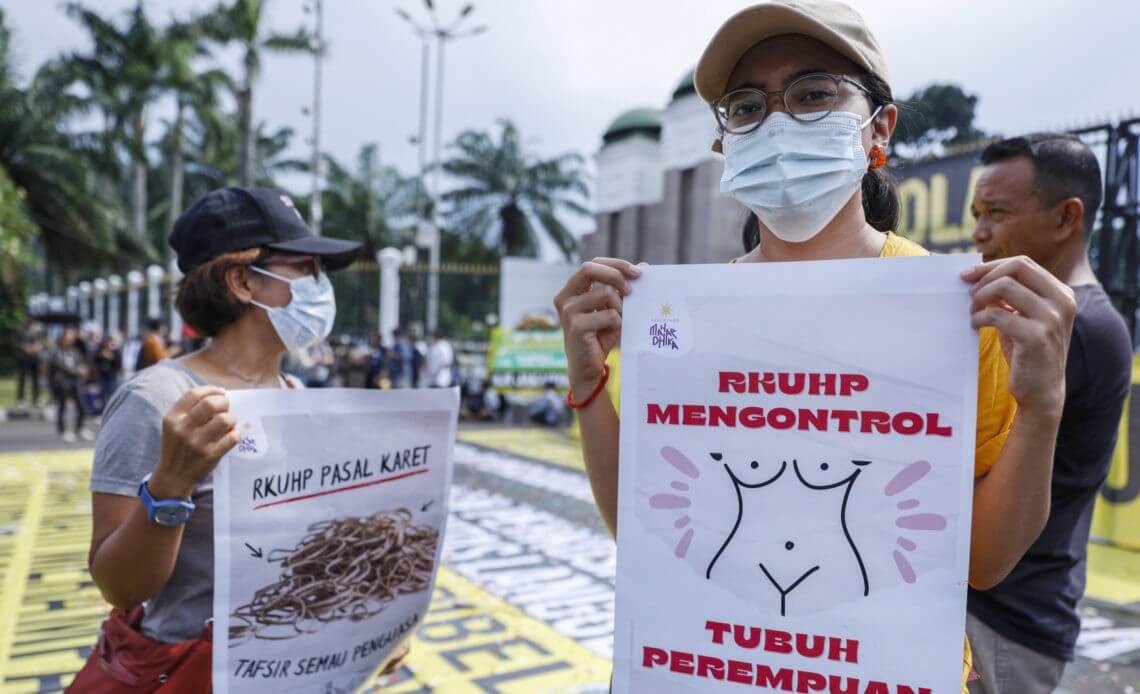The Indonesian Parliament on Tuesday unanimously voted to criminalise extramarital sex, in an effort to align the country’s laws with its “values.”
The new amendment will make sex outside marriage punishable by a year in jail, while cohabitation between unmarried couples will be punishable by six months. The latest law pertains to premarital sex as well as adultery.
It is, however, a weaker version of an earlier amendment, as the charge must be based on police reports and can only be lodged by spouses, parents, and children.
The new code passed with support from all parties in the parliament, dominated by the ruling Onward Indonesia Coalition.
Passage of #Indonesia's rights abusing criminal code that outlaws sex out of wedlock will blow up #Bali's tourism industry is what I'm hearing at the resort where I'm staying for a just completed conference. Why is @jokowi & his government trying to ruin the country's tourism? pic.twitter.com/EVxIxsxdx5
— Phil Robertson (@Reaproy) December 6, 2022
President Joko Widodo is yet to approve the law and the government believes it will not be completely executed for another three years, as implementation guidelines are being chalked out. However, once enforced, the ban will also extend to foreign visitors.
Deputy Justice Minister Edward Omar Sharif Hiariej said ahead of its passage that he was proud his country was about to adopt a criminal code that falls “in line with Indonesian values.” He added that it was time to forgo laws set by the Dutch during the country’s colonial era.
🇮🇩 #Indonesia: UN experts are concerned about draft Criminal Code which could mean serious regression of human rights by punishing extramarital sex, abortion and hampering fundamental freedoms, particularly for women & girls, LGBTI persons and minorities: https://t.co/6OilnjrjUt
— UN Special Procedures (@UN_SPExperts) December 1, 2022
Law and Human Rights Minister Yasonna Laoly defended the amendment's passage in parliament on Tuesday, arguing that it is “not easy for a multicultural and multi-ethnic country to make a criminal code that can accommodate all interests.”
Praising the new amendments as a “historic step,” the minister remarked during a news conference: “It turns out that it is not easy for us to break away from the colonial living legacy, even though this nation no longer wants to use colonial products.”
The good news is minimum jail terms for corruption offenders reduced from 4 to 2 years.
— amanda hodge (@hodgeamanda) December 6, 2022
“Finalising this process demonstrates that even 76 years after the Dutch Criminal Code was adopted as the Indonesian Criminal Code, it is never too late to produce laws on our own,” Laoly said, adding, “The Criminal Code is a reflection of the civilization of a nation.”
Rights groups, however, have criticised the revision for its vagueness and have warned that the broadness of such a measure could violate freedom of expression and privacy rights and could give the state the power to penalise normal activities.
For a nation as large, and as diverse as Indonesia, there will be very few beliefs, behavior, sentiments, expressions, ideas, etc, that won't be risking punishment. It will be disproportionately hostile to leftists, women, queer people, and political dissents.
— Antonia Timmerman (@timmerman91) December 6, 2022
They have also pointed to the possibility of increased moral policing in the world’s largest Muslim-majority nation, which has witnessed a rise in religious conservatism in recent years. In fact, the changes also stipulate that any ‘deviation’ from the core tenets of the country's six recognised religions—Islam, Protestantism, Catholicism, Hinduism, Buddhism and Confucianism—will result in a five-year prison sentence. In fact, it is now illegal to convince someone to renounce their religion.
On Indonesia parliament voting to outlaw extra-marital sex, State Department spokesman Price says ban would hit "fundamental freedoms" and could impact "investment climate for US companies"
— Shaun Tandon (@shauntandon) December 6, 2022
Opponents of the law have voiced concern that its application to non-citizens could scare away foreign investors and tourists, a prime source of revenue for the island nation. Tourism to Indonesia has already dwindled since the onset of the pandemic.
“We deeply regret that the government have closed their eyes. We have already expressed our concern to the ministry of tourism about how harmful this law is,” Maulana Yusran, the deputy chief of Indonesia’s tourism industry board, told Reuters. She said that the new amendments are “totally counter-productive.”
On the flip side, some advocates celebrated it as a victory for the country’s LGBTQ community. After intense debate, the parliament finally voted against including an article proposed by Islamic groups, which would have criminalised gay sex.
🇮🇩 The new criminal code was backed by all of #Indonesia's political parties. MPs said they wanted to put an end to the current penal code, which dates back to the Dutch colonial era.
— FRANCE 24 English (@France24_en) December 6, 2022
The laws forbidding extra-marital sex and cohabitation will also apply to foreign tourists ⤵️ pic.twitter.com/sjN9OCzVn4
The parliament also passed articles that criminalise blasphemy, protesting without notification, and spreading views that go against the Asian nation’s secular state ideology, all of which have also spread concern about the freedom of expression and association. Insulting the president, vice president, or state institutions can now result in a three-year prison sentence.
There is also a ten-year prison sentence for those found to be associating with Marxist-Leninist organisations and communities and a four-year sentence for those deemed to be spreading communism.
Furthermore, the changes keep in place the death penalty, though convicts will now be given a ten-year probationary period, during which their sentence can be reduced to life imprisonment or 20 years contingent on good behaviour.

